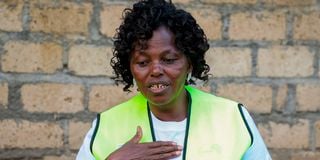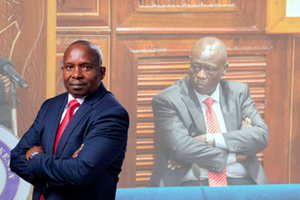I regret cutting my girls: A Maasai mother's courageous confession

Community Dialogue champion Senewa Letuya Njane in Narok County on September 24, 2024.
What you need to know:
- Senewa Letuya, a Maasai mother from Narok County, underwent a profound transformation from practicing FGM on her own daughters.
- After realising the harm caused by the vice, she sought forgiveness from her grown daughters and dedicated herself to educating her community about the dangers of the practice.
The sun-baked earth of Nairragie Enkare in Narok North bore silent witness to a moment that would change Senewa Letuya's life forever. As the morning light streamed through the acacia trees, her heart swelled with pride. She had just subjected her two young daughters to female genital mutilation (FGM), adhering to the age-old Maasai tradition she herself had endured as a girl. This was in the early 1990s.
Little did she know that this day would haunt her conscience for years to come, eventually sparking a remarkable transformation that would ripple through her community.
"I was cut while I was a young girl," Senewa recalls, her weathered hands clasped tightly in her lap. "When I got married, I ensured that I followed the culture and traditions of my community to the letter. At that time, I saw nothing wrong with it."
But as the seasons changed and the world beyond her village began to shift, her certainty about the practice began to crumble. It was during a government-led awareness campaign that the first seeds of doubt were planted in her mind. The speakers' words about the dangers of FGM and the penalties outlined in the Anti-FGM Prohibition Act of 2011, pierced through the veil of tradition that had shrouded her understanding for so long.
"The awareness campaign made me realise the grave mistake I committed against my daughters," she says, her voice heavy with remorse. "I regretted why I did that. It was an eye-opener, and I knew I had to do something to make peace with them."
Driven by a mixture of guilt and newfound enlightenment, Senewa took a brave step that would redefine her relationship with her children and her community. She summoned her daughters, now grown and married, back to their childhood home. The air was thick with tension as she prepared to confront the consequences of her past actions.
"They forgave us as parents for subjecting them to the cut and vowed not to cut their own daughters," she recounts, a hint of relief in her voice. "They said they understood that we did that as part of the culture. They also forgave themselves, as they were for it, as it was part and parcel of the culture."
This moment of reconciliation became the catalyst for her transformation. No longer content to be a passive participant in harmful traditions, she became a fierce anti-FGM crusader in her community.
Her younger daughters were spared from the cut, and Senewa devoted herself to holding awareness campaigns across Narok, one of Kenya's 22 FGM hotspot counties.
"We have been holding community dialogues to sensitise the community about FGM," she explains, her eyes alight with passion. "The dialogues include showing the health effects of FGM."
Her journey from practitioner to activist has not been without challenges. The vast expanse of Narok County, coupled with limited resources, has made it difficult to reach all areas where FGM is still prevalent. Undeterred, she continues her mission, appealing for support in the form of motorbikes to help her team access remote villages.
As a pastor at the Joy Celebration Church, she recognises the crucial role that religious institutions can play in combating FGM.
"The church needs to take a firm stand against such outdated harmful cultural practices," she asserts, her voice ringing with conviction.
Her tireless efforts have not gone unnoticed. In 2022, she was honoured by President William Ruto on Mashujaa Day as the Narok County hero for her work in fighting FGM and gender-based violence.
"I was happy to get the recognition from the government," she says. "I felt humbled to know that my work was being recognized."
Today, Senewa is part of an initiative spearheaded by UNFPA and the Centre for Rights, Education, and Empowerment (Creaw) that focuses on economic empowerment to address gender inequality, a key driver of FGM. Through this program, she has received training in awareness creation techniques and gained access to campaign materials that have amplified her voice against harmful cultural practices.
Anders Thomsen, UNFPA Country Representative, sheds light on the organisation's approach: "Women engaged in these programs develop a new sense of confidence and are acting as agents of change to ensure most of the girls at risk are protected from FGM. They work closely with the local administration and rescue centres on FGM prevention and response."
Thomsen acknowledges the challenges they face, noting, "The deeply rooted socio-cultural norms require sustained engagement with communities to realise transformation."
William Mbanyamlenge, from Creaw, adds his voice to the narrative: "The project's impact is evident, with beneficiaries gaining access to essential services such as healthcare, legal aid, and psychosocial support to address issues related to gender-based violence and FGM."
UNFPA's commitment to ending FGM extends beyond Narok. Similar initiatives are being implemented in Baringo, Garissa, West Pokot, Samburu, Bungoma, Isiolo, and Elgeyo Marakwet counties, creating a network of change across Kenya's FGM hotspots.
The impact of these collective efforts is beginning to show. According to the 2022 Kenya Demographic Health Survey, FGM prevalence in Narok now stands at 51 per cent, a significant improvement from 74 per cent in 2014.
As the sun sets over the Narok landscape, casting long shadows across the land where Senewa once perpetuated the very practice she now fights against, her story stands as a testament to the power of education, forgiveness, and personal transformation.





